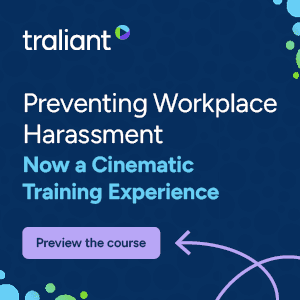Corporate compliance professionals are no doubt familiar with diversity as it relates to DEI efforts. But support is growing for another type of diversity — neurodiversity. With estimates that say as many as 20% of the world’s population is neurodivergent (that’s more than the share of people who are left-handed), it’s on companies to adjust. Deb Muller of HR Acuity explores just one of the many ways neurodiversity in the workplace will affect companies’ policies and procedures: investigations.
Neurodiversity is an increasingly important part of cultivating a diverse, high performing workforce. In fact, recent research published in Harvard Business Review suggests that teams that include neurodivergent members can be upwards of 30% more productive than those without them. What’s more, research suggests that embracing and integrating neurodivergent professionals can also boost team morale.
If the term neurodiversity or neurodivergence is fairly new to you, it refers to variations in an individual’s brain and cognition. These variations can include sociability, learning ability, attention, mood and other mental functions. Neurodiverse people, as opposed to those considered neurotypical, are those with conditions such as autism spectrum disorder, ADHD, speech disorders, dyslexia, dysgraphia, dyspraxia, dyscalculia and Tourette’s syndrome.
Traditional categories associated with DEI may be easier to identify; for example, race, gender, age, ethnicity, sexual orientation or physical disability. By contrast, neurodiversity can be subtle if not invisible.
This is especially true when neurodivergent people cope by masking their behaviors in order to feel accepted. Even though it’s harder to identify, we know neurodivergence not only exists but to some extent is gaining mainstream acceptance and broader awareness. Roughly 15% to 20% of the global population is considered neurodivergent.
Déjà Vu All Over Again: NLRB Returns to a Restrictive Employee Handbook Standard
With their early August ruling in a case involving Stericycle and a Teamsters union local, members of the National Labor Relations Board (NLRB) have once again redefined what constitutes acceptable workplace rules.
Read moreDetailsOutside of work, we see “unmasked” neurodivergent people openly sharing their experiences and connecting through their relatable challenges. One quick scroll on TikTok, and you’ll see this community weighing in on what they do (and don’t) appreciate at work.
Unfortunately, the lack of awareness about neurodiversity could result in teammates, managers and other professional colleagues not understanding the unique requirements of these employees or the unique skills they may bring. For example, research has shown these individuals often feel unappreciated.
That’s where employee relations and human resources teams have a chance to lead thoughtfully and proactively to accommodate neurodivergent employees at work, including by reevaluating their investigations procedures.
As investigators, our role is unchanged. We are there to fact-find, determine credibility, apply our findings to policies and assess if a violation exists. That said, thinking about investigations in the context of interviewing neurodivergent witnesses means we also have to understand and adjust to the unique challenges they may encounter during an interview. Some of those challenges may include feeling stress, struggling to focus, avoiding eye contact, distracting body language and manner of verbal communication.
We as investigators have to ensure our perception of their answers aren’t tainted by unconscious bias or unintentional ableism. While our role doesn’t change, our approach has to. Here are three investigation areas to rethink as you accommodate neurodivergent employees who interact with internal investigations:
Rethink how you determine credibility
Our brains have been trained for decades to associate some behaviors with a lack of credibility. Think: lack of eye contact, nervous body language, sweating and long pauses. Highly credible neurodivergent witnesses may naturally display these traits in absence of any attempt to obfuscate the truth. Therefore, it’s important to make these witnesses as comfortable as possible.
Strategies for making neurodivergent witnesses more comfortable in interviews include:
- Using inclusive language.
- Avoiding jargon and acronyms.
- Checking in during the interview to see if questions are clear to the witness.
- Providing advanced notice of the process so they know what to expect.
- Removing potential environmental distractions.
- Scheduling time for breaks.
- Providing post-interview support, such as excusing them from work for the rest of the day.
Prepare for a more flexible role
In the process of adapting your interview approach to accommodate neurodivergent witnesses, you may find yourself stepping into uncharted territory. For example, a witness may become visibly distressed and you may need to quickly move from interviewer to support person. Conversely, a witness may resist opening up or they may begin to overshare and you may need to move from objective investigator to adept conversationalist. Being flexible and remaining calm are key.
Strategies for supporting a witness who is visibly distressed:
- Stay with the witness and remain calm.
- Ask them if they can tell you what they need.
- Count them through inhaling and exhaling.
- Ask them to try the 3-3-3 method. Ask them to name three objects they see, three sounds they hear, and then ask them to move three body parts.
- Communicate what steps you’ll take if the symptoms persist and be prepared to call in external resources.
Strategies for getting an oversharer back on task:
- Redirect witnesses back to the issues at hand.
- Explain that you understand what they are sharing, but remind them that personal information is not necessary in this case.
- Suggest a water break to interrupt the conversation and refocus them.
- Be flexible enough to suggest rescheduling if it’s needed.
Strategies for getting an undersharer to open up:
- Ask them about easier topics including what their team does.
- Ask objective questions about the company.
- Ask them if there are parts of the interview process they don’t understand.
- Ask them if there is anything you can do to make them more comfortable.
Adapt your documentation approach
Documentation will always be a critical part of successful interviews. That will never change. However, your approach to documentation may need to adapt. First and foremost, it’s important to use appropriate language and keep any mentions of someone’s disability or diagnosis to a minimum unless it is essential to the case. For example, a complainant alleges discrimination and retaliation for having taken FMLA leave for their own medical condition. In that instance, it’s important to describe what the condition is. On the flip side, if the witness is not the complainant and is merely providing an account of what happened on their team, their own personal diagnosis may not be relevant and probably doesn’t need to be mentioned.
Strategies for adapting your documentation process to accommodate neurodivergent witnesses:
- Document specific accommodations that were made for the interview. For example, requested time limits, remote interviews or visual aids.
- Document specific accommodations within the interview notes section of the case file so they are easily accessible.
- Document specific reasons if an interview is cut short, including what the witness said and how they behaved. Also make sure to document if/when the interview was rescheduled.
- Document any emotional support companion including name, title/role/relationship to witness and contact information.
Best practices to support a neurodivergent workforce will continue to evolve, but one thing is already clear: A well supported, neuro-inclusive workforce can bring significant competitive advantage to an organization. Neurodivergent employees offer creativity and innovation, lateral thinking, strategic analysis, strong problem-solving and spatial reasoning capabilities, more sustained attention to detail and boosted morale — and they know it. The more leadership and HR can do to support these employees in a way that helps them feel understood and respected, the more the organization will attract these uniquely talented individuals.




 Deb Muller is CEO of HR Acuity. After serving in executive HR roles at numerous Fortune 500 companies, including Honeywell, Citibank and Marsh & McLennan, Deb launched HR Acuity to create technology with built-in expertise and equip organizations to manage employee relations more strategically.
Deb Muller is CEO of HR Acuity. After serving in executive HR roles at numerous Fortune 500 companies, including Honeywell, Citibank and Marsh & McLennan, Deb launched HR Acuity to create technology with built-in expertise and equip organizations to manage employee relations more strategically. 







